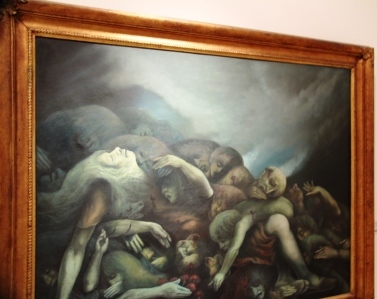
Ruben Martinez’s Procer Jose Simeon Canas
Carlos Canas’ painting entitled Sumpul was on my “must see” list before arriving in San Salvador this trip. The title caught my attention because it is based on the May 14, 1980, Sumpul River Massacre during the nation’s civil war which I am very familiar with having read much about it in books such as Yvonne Dilling’s In Search of Refuge. Also we planned to be interviewing a couple of survivors of that massacre for our project.
This piece of art is based on that event, and its artist was recently awarded the 2012 National Cultural Prize for this work. It has been compared to the Picasso’s Guernica depicting the Spanish Civil War.

Sumpul on display at the Marte Museum
Sumpul is on display at the Marte Museum in the San Benito district of San Salvador. Seeing it evokes strong emotion, reaching deeply into one’s soul as art is intended to do. The museum is a worthwhile afternoon and nice break from intensive interviewing.
This contemporary museum houses a variety of art including Ruben Martinez’s huge bronze sculpture entitled Procer Jose Simeon Canas. Historically the subject was a doctor, minister, and university administrator responsible for pushing through the abolition of slavery in Central America in 1823. This breathtaking piece is located in a central two-story open gallery. Pictures cannot do justice to the immense size of this piece. This reclining figure whose arm is raised up into the sky creates an emotional impact upon the viewer.
Likewise the MUNA, the national anthropology museum right down the road – with the Sheraton in between – is another gemstone in the city. This contemporary museum focuses on religion, culture, social, commerce, plants, animals, and handicrafts of the country. Relics date from pre-Colombian era of 1500 B.C. There are some primitive marked stones extracted from a lake in Santa Ana dating back 7,000 years ago.
The indigenous cultures up through the 1980’s are embodied in the thoroughly represented religion room. Part of the introduction to the religion room read:
“The main objective is to save the spirit and experiential elements of religion so present and future generations will have a background to deeply consider and analyze according to their criteria.”
This museum helped me pull many bits of information together into a better chronology and understanding of El Salvador as a country as it formed, from its colonial period to present times.
It was nice to see art and culture returning to this country where even in recent history it has been repressed.


